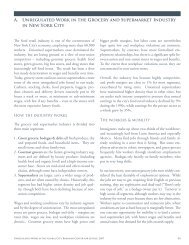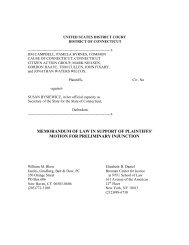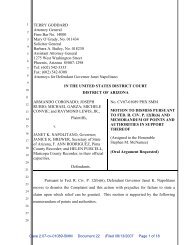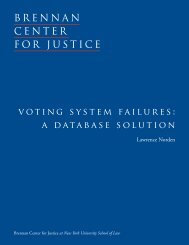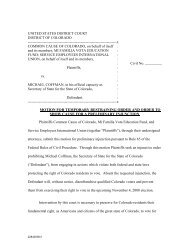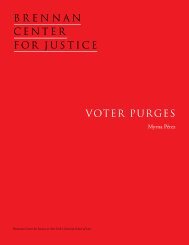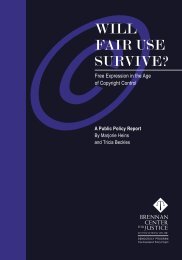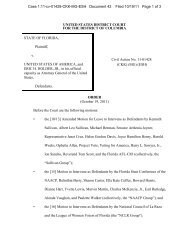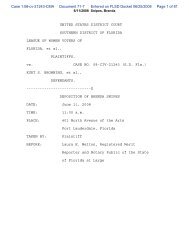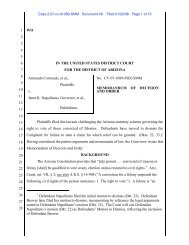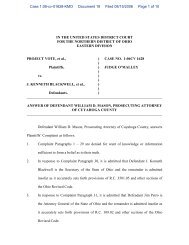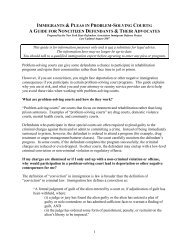Jim Crow in New York
Jim Crow in New York
Jim Crow in New York
Create successful ePaper yourself
Turn your PDF publications into a flip-book with our unique Google optimized e-Paper software.
jails, may expla<strong>in</strong> the decision to <strong>in</strong>clude larceny <strong>in</strong> the list of crimes that<br />
would result <strong>in</strong> disenfranchisement.<br />
Even <strong>in</strong> the wake of the<br />
Civil War and as states<br />
were ratify<strong>in</strong>g the<br />
Fourteenth Amendment,<br />
the expansion<br />
of the franchise <strong>in</strong><br />
<strong>New</strong> <strong>York</strong> was met<br />
with the same opposition<br />
as it had been for<br />
the last one hundred<br />
years. At <strong>New</strong> <strong>York</strong>’s<br />
Constitutional Convention<br />
<strong>in</strong> 1867, Delegate<br />
H.C. Murphy stated<br />
that the extension<br />
of the franchise was<br />
morally and socially<br />
wrong, and that it<br />
would “confound the<br />
races, and … destroy<br />
the fair fabric of<br />
democratic <strong>in</strong>stitutions,<br />
which has been<br />
erected by<br />
the capacity of the<br />
white race.”<br />
Violent Resentment of the Civil War<br />
and its Aftermath<br />
In 1863, <strong>New</strong> <strong>York</strong> City was the nation’s commercial and manufactur<strong>in</strong>g<br />
center, but it rema<strong>in</strong>ed sharply divided along l<strong>in</strong>es of race, class and politics.<br />
It also harbored a deep, anti-Civil War resentment. 62 In July 1863, this divide<br />
– as well as fierce opposition to the war and its consequences – ignited<br />
the notorious <strong>New</strong> <strong>York</strong> City Draft Riot, four days of mob terror which one<br />
noted historian calls “the largest civil <strong>in</strong>surrection <strong>in</strong> American history apart<br />
from the South’s rebellion itself.” 63 Beg<strong>in</strong>n<strong>in</strong>g with an attack on a conscription<br />
office, the riot quickly developed <strong>in</strong>to “a wholesale assault upon all the<br />
symbols of the new order be<strong>in</strong>g created by the Republican Party and the<br />
Civil War.” 64 Blacks were targeted, and at least 105 people were murdered<br />
and hundreds more driven from the city. 65 The riots augmented the tense<br />
race relations <strong>in</strong> the city dur<strong>in</strong>g the era, and led to a population decl<strong>in</strong>e of<br />
over 2,500 blacks <strong>in</strong> the city between 1860 and 1865. 66 Although <strong>New</strong> <strong>York</strong><br />
City was by some measures the beacon of Northern free society, it rema<strong>in</strong>ed<br />
bitterly divided by the changes brought on by the Civil War.<br />
When the Civil War ended <strong>in</strong> 1865, America’s slaves were f<strong>in</strong>ally and<br />
forever freed. Between 1865 and 1870, the country adopted the Reconstruction<br />
Amendments – the Thirteenth, Fourteenth and Fifteenth<br />
Amendments to the U.S Constitution – which opened the door to a<br />
“new birth of freedom,” end<strong>in</strong>g slavery, grant<strong>in</strong>g equal citizenship to<br />
freed slaves and prohibit<strong>in</strong>g racial discrim<strong>in</strong>ation <strong>in</strong> vot<strong>in</strong>g. Not surpris<strong>in</strong>gly,<br />
these sweep<strong>in</strong>g constitutional changes rek<strong>in</strong>dled the national<br />
debate on black suffrage.<br />
<strong>New</strong> <strong>York</strong> convened another Constitutional Convention <strong>in</strong> 1867. The<br />
Convention summoned a Committee on Suffrage, which recommended<br />
remov<strong>in</strong>g the black-only property qualification. 67 But even <strong>in</strong> the wake of<br />
the Civil War and as states were ratify<strong>in</strong>g the Fourteenth Amendment,<br />
the expansion of the franchise <strong>in</strong> <strong>New</strong> <strong>York</strong> was met with the same opposition<br />
as it had been for the last one hundred years. Delegate H.C. Murphy<br />
stated that the extension of the franchise was morally and socially<br />
wrong, and that it would “confound the races, and … destroy the fair<br />
fabric of democratic <strong>in</strong>stitutions, which has been erected by the capacity<br />
of the white race.” 68<br />
11<br />
Brennan Center for Justice


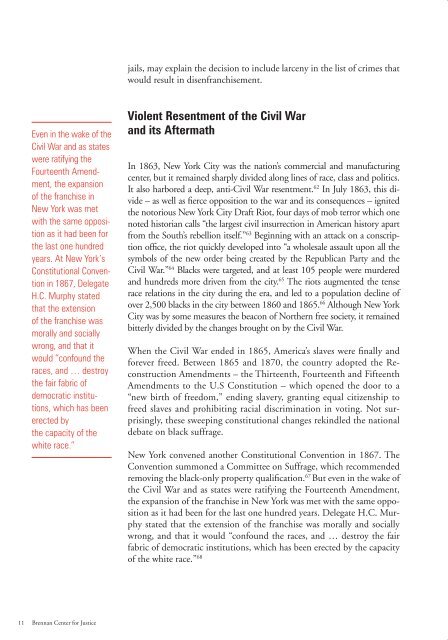
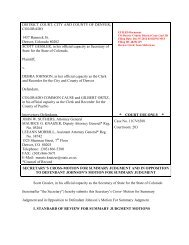
![Download the Letter [PDF] - Brennan Center for Justice](https://img.yumpu.com/50139248/1/190x245/download-the-letter-pdf-brennan-center-for-justice.jpg?quality=85)
